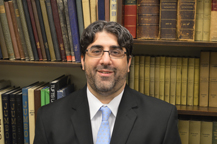- About Archives
- About SAA
- Careers
- Education
- Publications
- Advocacy
- Membership

Professional Experience: Director of Digital Collections and Archives, Tufts University, 2014–present. Assistant University Archivist for Technical Services, Mudd Library, Princeton University, 2005–2014. Project Archivist, Mudd Library, Princeton University, 2004. Archivist, New York Public Library, 2003. Assistant Archivist, Special Collections Library, University of Michigan, 2001–2002. Manuscript/Reference Assistant, Bentley Historical Library, University of Michigan, 1999–2001.
Education: MSI, Archives and Records Management, University of Michigan, 2001. BA, History, Wesleyan University, 1995.
Professional Activities: Society of American Archivists: Member since 2000; Co-Chair, Standards Committee, 2013–present (member, 2012–present); Nominating Committee, 2009; EAD Roundtable liaison to Standards Committee, 2007–2009; Workshop Instructor, 2008–present. Mid-Atlantic Regional Archives Conference: Nominations and Elections Committee, 2008; Program Committee, Fall 2006; Workshop Instructor, 2007. Other: Lecturer, Rutgers University School of Communication and Information, 2013; Participant, Archives Leadership Institute, 2012; Reviewer, NHPRC, 2005, 2009, and New Jersey PARIS grants program, 2008–2009.
Presentations/Publications: Numerous presentations on topics including hiring and management, archival processing, descriptive standards, and digitization. Author of Extensible Processing for Archives and Special Collections (ALA/Neal-Schuman, 2014) and Designing Descriptive and Access Systems (SAA, 2013); co-authored article on DACS implementation for Spring/Summer 2008 American Archivist.
Awards: SAA: C.F.W Coker Award, 2013; MARAC: Frederic Miller Award, 2008, 2012.
***
Question posed by Nominating Committee: How would you utilize your skills and experience to help make SAA thrive in an environment that expects more communication, collaboration, and demonstrated action?
Communication, collaboration, and demonstrated action from SAA Council members are essential in ensuring that SAA functions effectively and meets the needs of its members. I have strived to demonstrate effectiveness in my work, including reducing processing backlogs, finding new ways to deliver online content to users, and creating reasonable working environments for staff in sometimes challenging circumstances. This has enabled me to work closely with a wide variety of people, archivists and non-archivists, students and established professionals, high-level administrators and those at the lower levels of their organizations, or outside of formal organizations entirely. I have also served in roles within SAA requiring concrete action, including as a member of the Nominating Committee, as co-chair of the Standards Committee, and as a workshop instructor. Building consensus through collaboration and communication has been essential in my work, as it is for members of Council. I have a deep respect for the work of archivists and for the archival profession’s rich intellectual history and a commitment to archival values of openness and transparency. This commitment to core principles has been essential in both building consensus and making progress when faced with tough choices.
SAA’s membership has grown significantly and the landscape of the archives profession has changed since I became an archivist. Currently nearly 40 percent of SAA members have been in the organization for three years or fewer and 20 percent are students. For SAA to thrive we need to tap into this talent. Having served on more than 30 search committees in the last ten years, many involving hiring new professionals, I have sometimes noticed a disconnect between new and more established professionals around issues related to employment and compensation. Our profession’s leaders, including the members of SAA Council, should understand the challenges faced by those now entering the field, and work to facilitate their involvement within SAA. Ensuring that SAA’s membership, and the profession, reflect the diversity of society as a whole hinges on our ability to both attract and retain talented and engaged archivists. I have demonstrated throughout my career that I am committed to this goal.
As a Council member I would seek opportunities for enhanced communication with archivists and people in allied professions. Council has made efforts to work closely with leaders of sections and roundtables. We also need to foster communication with people outside of these structures, since, as SAA has grown, formally recognized leadership opportunities are not as prevalent as when I first joined the organization. The Code of Conduct approved by Council last year is an excellent example of member-driven action that originated outside formal SAA structures. We should continue to facilitate work of this type. It would also benefit Council and SAA as a whole to find ways to further include students, new professionals and individuals from the ARL/SAA Mosaic program in Council discussions.
Providing leadership for a growing volunteer organization in a rapidly changing environment is challenging work. For SAA to thrive we need to advocate for archivists as individuals and professionals, in addition to archival repositories and institutions, and get as many people as we can involved in moving our work forward. As your Council representative, working with you to make that happen would be my primary focus.